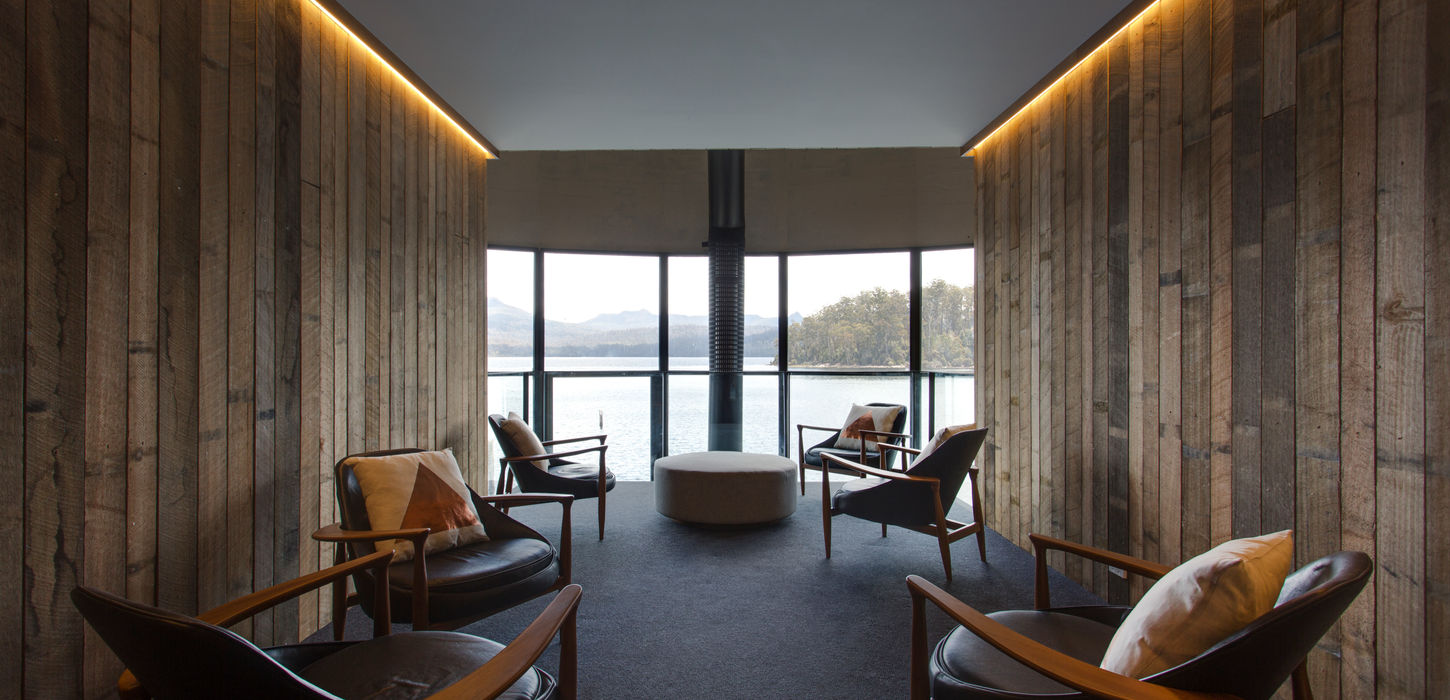A pier, a pumphouse and the hypnotic pull of Lake St Clair.
Suspended over the mirrored and mercurial Lake St Clair, sleep with the sense that you’re floating on water. Here, you’ll find two heritage-listed buildings transformed into an accommodation escape.
Deep in the wilderness, amidst dramatic mountains and dense rainforest, the two art deco buildings had sat unoccupied for 20 years. The three-storey Pumphouse, connected to land only by a 250-metre concrete flume, was constructed in the 1940s as part of the hydroelectric scheme. Our adaptive reuse design offers retreat amidst alpine, life-affirming surrounds.
CLIENT
Pumphouse Point
IMAGES
Adam Gibson, Sharyn Cairns, Brook Holm
LAND OF
leeawuleena
COLLABORATORS
Gandy & Roberts Consulting Engineers
TBS Engineering
Castellan Consulting
Vipac
Green Building Surveying
RED Sustainability Consultants
Mean Con
AWARDS

Here, guests retreat into rugged simplicity and uncomplicated comfort. Our design uses a simple neutral colour palette and local Tasmanian timber. And it gradually welcomes visitors into more refined surroundings as they escape an invigorating battering from the Tasmanian elements.
The entry and common space’s untreated rough-sawn hardwood and exposed servicing pipework subtly give way to more refined stained and smoothed timber panelling and exposed bent copper plumbing in the suites. These touches also nod to the Pumphouse’s original purpose. Thanks to exposed pipework, a visit to the bathroom recreates the sense of water rushing through the building, just as it did decades ago.
With Lake St Clair’s consistent temperature and the existing concrete’s thermal mass, the Pumphouse and Shorehouse rely on natural ventilation and localised heating. This meant we could forego traditional homogeneous approaches in favour of different strategies, like crackling wood fires in common spaces, and customisable panel heaters in the suites. It also allows for a gentle transition between the bracing outdoors and the sanctuary-style bliss of the suites.
Escape the elements.
Where human doings become human beings.
Without lavish resource, we created a retreat well-suited to its rugged surrounds. Along the way, we were enriched with a deeper understanding of both hospitality and heritage whilst we overcame hurdles without breaking stride. Yet it would be remiss not to say that the most striking elements are of course, nothing to do with us at all. In that, we’ll remain forever in awe of the incomparable Lake St Clair.
Lake St Clair’s indigenous name is leeawuleena, meaning ‘sleeping water’. Gaze from floor-to-ceiling windows over the deepest lake in Australia and you really sense the mystery of it all. When natural surroundings speak such volumes, our design aimed to whisper, not shout. By carefully adapting the building in line with World Heritage Area best practice, we hope to offer environmental stewardship and enhance this iconic property for generations to come.
Focused on sustainability and minimal site impact, we constructed 18 new guest suites within the existing building envelopes. Our initial briefing was clear: ‘don’t muck up the architecture’. So we didn’t. The concrete structure is untouched, its distressed state a remarkable testament to the harsh environment. We sought to magnify the contrast between the inviting interiors and gruff exterior. Yet, if you remove the interior timber framework, you’d never know accommodation had ever been there.
Think of the Pumphouse like a Neoclassical temple out in the middle of the lake. Anticipation builds as you walk along the concrete pier, surrounded by humbling mountains and water. We designed the 12 suites to run lengthways down the two outer wings of the building, with a communal lounge at the centre. This way, the same sightline from the pier approach goes all the way through the building.
Nature and nurture.





